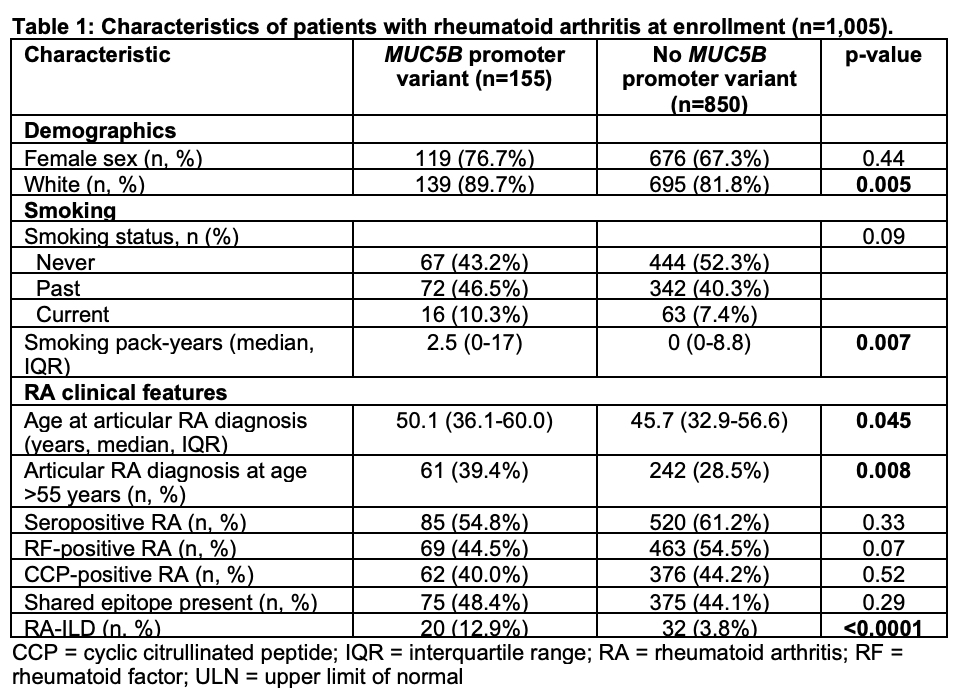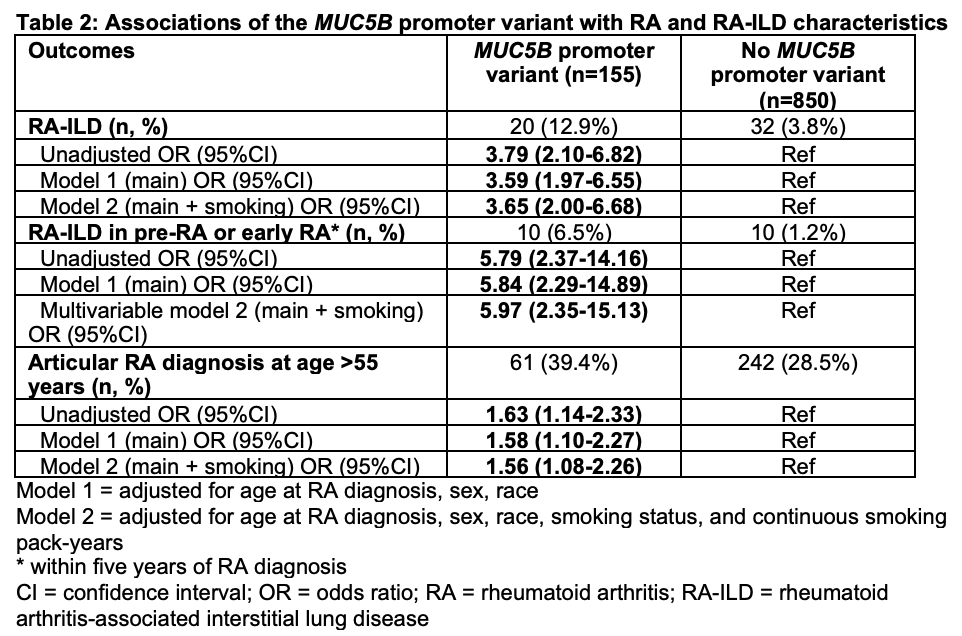Session Information
Date: Sunday, November 7, 2021
Title: Epidemiology & Public Health Poster II: Inflammatory Arthritis – RA, SpA, & Gout (0560–0593)
Session Type: Poster Session B
Session Time: 8:30AM-10:30AM
Background/Purpose: The common promoter variant of MUC5B (G >T, rs35705950) is associated with increased mucin 5B production in lung parenchyma and is an established genetic risk factor for rheumatoid arthritis-associated interstitial lung disease (RA-ILD). The associations of this genetic polymorphism with features of the articular RA disease course and RA-ILD onset have not been previously studied. We investigated the association of the MUC5B promoter variant with age of RA onset and timing of RA-ILD within the RA disease course.
Methods: Patients with RA were identified from a large, multi-hospital biospecimen and clinical data collection study using a previously described algorithm and confirmed by medical record review. All patients with RA who had computed tomography (CT) imaging of the chest, lung biopsy, or autopsy were identified and screened for RA-ILD. RA-ILD was confirmed based on imaging findings, pulmonary function testing, and pathologic information using accepted criteria. We analyzed RA patients with available genotype information on rs35705950. Dates of RA and RA-ILD onset were determined by medical record review. Smoking and other covariate data were obtained by health questionnaire survey at enrollment and supplemented by electronic query and medical record review. We compared continuous variables using Wilcoxon rank sum tests and categorical variables using chi-squared tests. We examined the associations between MUC5B promoter variant status and features of RA including age of RA onset and RA-ILD onset relative to articular RA-onset using multivariable logistic regression.
Results: We identified 1,005 RA patients with available genotype data for rs35705950 (mean age 45 years; 79% women; 83% White). The MUC5B promoter variant was present in 155 RA patients (15.4%). A greater proportion of patients with the variant developed RA-ILD (12.9% vs. 3.8%, multivariable odds ratio (OR) 3.59 [95%CI 1.97-6.55]. Patients with the MUC5B promoter variant had increased odds of RA-ILD in the early RA period (prior to or within 5 years of articular RA diagnosis; OR 5.84, 95%CI 2.29-14.89). The MUC5B promoter variant was associated with older age of articular RA onset (50.1 vs 45.7 years, p=0.045) and increased odds of articular disease onset after age 55 (OR 1.58, 95%CI 1.10-2.27. The proportion with seropositive RA was similar by MUC5B status (54.8% vs. 61.2%, p=0.33).
Conclusion: We found that the MUC5B promoter variant may influence both older-onset RA and RA-ILD development in preclinical or early RA. MUC5B may impact RA-ILD risk early in the disease course of RA, particularly in those with older-onset RA, regardless of serostatus. These findings may lead to the identification of RA patients amenable to screening or prevention strategies for RA-ILD.
To cite this abstract in AMA style:
McDermott G, Gill R, Gagne S, Byrne S, Huang W, Cui J, Prisco L, Zaccardelli A, Martin L, Shadick N, Dellaripa P, Doyle T, Sparks J. Associations of the MUC5B Promoter Variant with Timing of Articular Diagnosis and Interstitial Lung Disease in Rheumatoid Arthritis [abstract]. Arthritis Rheumatol. 2021; 73 (suppl 9). https://acrabstracts.org/abstract/associations-of-the-muc5b-promoter-variant-with-timing-of-articular-diagnosis-and-interstitial-lung-disease-in-rheumatoid-arthritis/. Accessed .« Back to ACR Convergence 2021
ACR Meeting Abstracts - https://acrabstracts.org/abstract/associations-of-the-muc5b-promoter-variant-with-timing-of-articular-diagnosis-and-interstitial-lung-disease-in-rheumatoid-arthritis/


